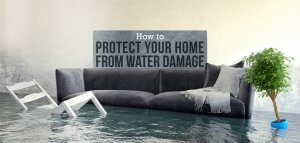Source: Farmer’s Insurance
Tip 1: Be careful where you plant
Some plants and trees, like weeping willows, have pretty invasive roots. If you’re not careful, they’ll grow right into your sprinkler system, drainage field, pipes, and septic tanks. Plan before you plant to keep roots away from any water lines. It’s not everyday that you’d think about this as one of the tips to prevent water damage!
Tip 2: Clean out roof gutters
You know it’s on your to-do list anyway, so if you can, take a safe climb up to your roof next Sunday and check out your gutters. If you’re seeing lots of leaves, birds’ nests, sticks, and whatnot up there, your gutters may not be doing the job you hired them for. And on a rainy day, a clogged gutter can send water spilling into your home’s foundation, through the roof, or down to your basement. That could cause some serious water damage! So next time you’re doing some seasonal cleaning, make sure those gutters are clean. And if your gutters are too high, be safe and get a professional to check them.
Tip 3: Keep an eye on your water bill
This is one of the trickiest of tips on this list. With so many water pipes hidden behind walls and in the floors in your house, you might not know there’s a leak until the damage is done. That’s why it’s a good idea to keep a close eye on your monthly water bill. If you see it starting to creep up, or get one that’s uncommonly high, it’s a pretty good sign that you may have a leak somewhere.
Tip 4: Use a drain snake instead of unclogging chemicals
No matter how crazy clean you are, from your shower to your kitchen sink, clogs are going to happen. And chances are at some point in your life you’ve used one of those powerful chemical drain cleaners to get things moving again. But as convenient as they may be, most folks don’t realize those caustic chemicals are also eating away at their pipes (and they might not be too good for you either). If you rely on them a lot, you could be setting yourself up for leaks. That’s why owning a drain snake is a good solution to clear away clogs. This is one of the less expensive tips, as you can get them at your local hardware store for cheap. Use them to cut through most any clog you’ll have without damaging pipes or making your eyes red and teary.
Tip 5: Never pour grease down your sink
You’ve probably heard this before, but you should definitely avoid pouring grease down your kitchen sink. It doesn’t matter if you flush it with hot or cold water. It can still congeal and cling to your pipes, and could still cause some serious damage and blockage.
Some people use detergent to break up grease before pouring it down the drain…and that may help sometimes. But there’s no guarantee that it’ll keep the grease from sticking to your pipes, so why take the risk?
The safest thing to do is just to pour your grease in an empty can, and either let it sit or put it in the refrigerator. Once it hardens you can toss it in the trash and get rid of it. Done and done.
Give us a call at (954) 733-1006 or visit our website at http://www.SERVPROftlauderdalenorth.com/
